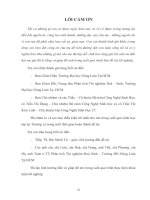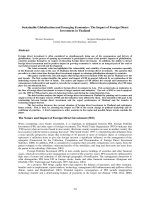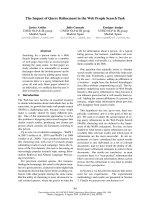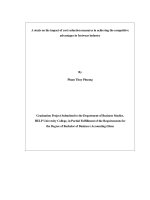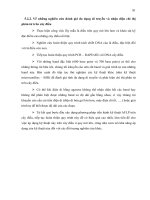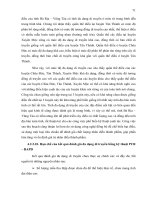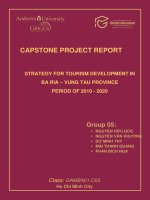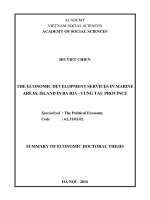The impact of relationship quality on start up performance of start up firms in ba ria vung tau province (tt)
Bạn đang xem bản rút gọn của tài liệu. Xem và tải ngay bản đầy đủ của tài liệu tại đây (262.43 KB, 4 trang )
ISSN No:-2456-2165
The Impact of Relationship Quality on Start-up
Performance of Start-up Firms in Ba Ria - Vung Tau
Province
Tran Nha Ghi
Abstract:- This study examines the components of
relationship quality influencing start-up performance.
Relationship quality is presented by the components
trust, commitment, satisfaction, communication quality
of relationship, relationship-specific investments between
start-up firms and local start-up support organizations
in Ba Ria - Vung Tau province. This study uses quantity
research methods by applying Structure Equation
Modeling (SEM) with a sample of 425 start-up owners.
The findings show that the components of relationship
quality positively influences start-up performance. In
conclusion, the study proposes managerial implications
for start-up firms and suggests directions for further
researches.
Keywords:- Relationship quality, start-up performance.
I.
INTRODUCTION
The theory of relationship quality (RQ) has been
developed in different fields, the major transaction subjects
are B2B, B2C and C2B. Osobajo & Moore (2017) examined
RQ researches (1987-2015) that the relationship between
firms and local community organisations was not to be
discovered. According to GEM (2016) business
development surveys in Vietnam indicated that operating
rate in the early start-up phase was very low (at 12,5%) and
remained operations under 3,5 years. Failure causes pointed
were defects in building RQ with partners and business
model innovation (Nguyen Quang Thu et al, 2017).
The study is conducted in BRVT province as there is a
strong growth in the number of start-ups. However, cases of
dissolution, revocation of business licenses of start-up firms
went upward. Therefore, the study conducted was to help
start-up firms focus on building relationship with local start
up support organizations to improve start-up performance.
The research target is to assess impacts from the
components of RQ to start-up performance, with two new
contributors:•
• Identifying the components of RQ between start-up firms
and start-up support organizations;
• Testing the relationship between RQ and start-up
performance for start-up firms.
II.
A.
THEORETICAL FRAMEWORK
Definition o f RQ
Start-up firms to build a qualified relationship with
start-up support organizations, the minimal requirement is
having the start-up project with creative innovations. Start
up support organizations will assist over functions or
commitments. Start-up firms have to meet the commitments
assisted initially and maintain the relationship through
relationship investment activities (Nyaga & Whipple, 2011),
frequent communication (Lages & ctg, 2005).Since, both
sides will be satisfied with the relationship and foster
cooperation. Hence, RQ between start-up firms and start-up
support organizations is multi-directional, based on
perception of each side when gaining trust, satisfaction,
commitment
level,
relationship
investment
and
communicating quality of the relationship for the start-up
project.
B.
Definition o f start-up performance
Littunent et al (1998) defined start-up performance as
existence/ survival over the first three years and,
continuously operating after the early start-up stage. Based
on the points of view of GEM (2016); Littunen, Storhammar
and Nenonen (1998), Nguyen Dinh Tho and Nguyen Thi
Mai Trang (2009), start-up performance is understood as the
survival of start-up firms in the early start-up phase (less
than 3,5 years), stably operating and achieving the
objectives of start-up individuals (revenue, profit and market
share as desired).
C. Research model and hypotheses
Based on the criterial consequences of RQ, this study
examines the relationship between components of RQ, and
their influences on start-up performance. RQ is a multi
directional
concept,
but,
there
is
an
amid
correlation(Skarmeas & Robson, 2008). The theoretical
model is proposed in Figure 1.
ISSN No:-2456-2165
Fig 1: - Research model
Start-up support organizations will help start-up firms
dedicate to found and invest in business. Commitments of
support from start-up support organizations will help start
up improve start-up performance in the early start-up stage.
Hypothesis Hi proposed.
H1: Commitments
performance;
influence
positively
to
start-up
Doney & Cannon (i997)identified trust as reliability,
goodwill derived from the nature of interactivehonesty.
Once start-up support organizations give trust to start-up
firms, they will willingnessly collaborate, share and provide
essential resources. Trust brings a positive influence on
effectiveness among organizations (Ireland & Webb, 2007).
Hypothesis H2 is stated:
H2: Trust influence positively to start-up performance;
Caceres & Paparoidamis (2007) demonstated a
positive relationship between satisfaction and trust,
satisfaction influences positively to exporting activities
performance (Ural, 2009). When start-up firms and
organizations are statisfied about operations: information
sharing, honesty level, coordination of activities, interaction
level and participation in making decision... trust in the
relationship in both sides is at higher level. Since, start-up
support organizations willingnessly provide supporting
resources to improve start-up performance. Hypotheses H3a ,
H3b are proposed:
H3a: Satisfaction influences positively to
performance;;
H3b: Satisfaction influences positively to trust;
start-up
Relationship quality influences positively to
commitments, trust and operating performance (Kuhlmeier
& Knight, 2014). As start-up firms communicate regularly
with start-up support organizations to foster carrying out the
initial supporting commitments, creating much closely
relationship contributing to improve start-up performance.
Hypotheses H4a , H4b and H4c are stated:
H4a: Communication quality influences positively to start-up
performance;
H4b: Communication quality influences positively to
commitments;
H4c: Communication quality influences positively to trust;
Kwon (2011) demonstrated that relationship
investment influences positively to trust and commitments
between exporters and foreign customers. As start-up firms
investing in relationship with start-up support organizations
will foster initial commitments, enhance trust and two sides
feel satisfied about this relationship. Gurcaylilar-Yenidogan
et al (2013) showed relationship investment would improve
operating effectiveness. Hypotheses H5a, H5b, H5c and H5d
are proposed.
H5a: Relationship investment influence positively to start-up
performance;
H5b: Relationship quality influence positively to satisfaction;
H5c: Relationship investment influence positively to trust;
H5d: Relationship quality influence positively to
commitments;
III.
DATA
This study uses direct interview technique and e-mail
sending with a detailed questionnaire with a 5-level Likert
scale (from 1: completely disagree to 5: fullyagree).
Sample: sample was selected conveniently upon the
principle 5:1 (Bollen, 1989). The model has 25
observational variables so the minimum sample size is 125
(25*5). The number of start-up firms is 4470 so the sample
size is estimated upon Yamate (1967) with 95% confidence
level and 5% standard error:
4470
n = ------------------- = 367
1+ 4470x0.052
During the data collection had to remove the
unsatisfactory surveys. The sample size added 25% of the
minimum sample size: 367*(1+25%) = 459. So the number
of survey questionnaires was 459, collected 431, excluding
6 invalid questionnaires. The remaining formal sample was
425.
ISSN No:-2456-2165
IV.
RESEARCH RESULTS
The result of the CFA analysis with the saturated
model showed that the Chi-squared statistic was %2[260] =
433,766 (p=0,000). If the degree of freedom is adjusted at
CMIN / df = 1,668<2, satisfactory compatibility. Other
indicators, such as GFI = 0,924, TLI = 0,963, CFI = 0,968,
RMSEA = 0,040 <0.80, were satisfied. CFA coefficients of
all the observational variables are greater than 0,5 (Table 4.)
that affirm unidirectionality and convergent values of the
constructs used in the research model. Thus, the saturated
model achieves the level of compatibility with market data.
SEM results (Figure 2), theoretical model has %2[263]
=
447,581;
p
=
0,000;
CMIN/df = 1,702 < 3; GFI = 0,922; TLI = 0,962; CFI =
0,966; RMSEA = 0,041. Heywood phenomenon does not
appear in the estimation of SEM so the model is compatible
with market data.
Results of key parameters are presented in Table
5.Accordingly, commitments and trust influence positively
to start-up performance (Hi: P = 0,124; p =0,054; H2: P =
0,369; p = 0,000). Satisfaction influences positively to start
up performance and trust (H3a: P = 0,114; p = 0,021; H3b: P
= 0,170; p = 0,002). Communication quality influences
positively to start-up performance, commitments and trust
(H4a: P = 0,178; p = 0,002; H4b: P = 0,294; p = 0,000 và H4c:
P = 0,166; p = 0,000). Finally, relationship investment
influences posively to start-up performance, satisfaction,
commitments and trust (Hsa: P = 0,120;p = 0,072; Hsb P =
0,335; p = 0,000; Hsc: P = 0,306; p = 0,000 và Hsd: P =
0,446; p =0,000). The proposed hypotheses are accepted,
none of them are rejected.
Estimate
t
B
S.E.
P
<—
0,318
0,052
0,335
6,101
SATIS
RSI
<—
COM
COMQUAL
0,351
0,068
0,294
5,166
TRUST
<--COMQUAL
0,204
0,072
0,166
2,840
TRUST
<--0,176
0,057
0,170
3,090
SATIS
COM
<--0,426
0,056
0,446
7,625
RSI
<--TRUST
0,301
0,063
0,306
4,798
RSI
<--STARTPERF
TRUST
0,335
0,055
0,369
6,071
<--STARTPERF
COMQUAL
0,200
0,064
0,178
3,120
<--STARTPERF
0,107
0,047
0,114
2,300
SATIS
<--STARTPERF
0,107
0,060
0,120
1,799
RSI
<—
STARTPERF
COM
0,116
0,060
0,124
1,925
Table 5. SEM results
Notes: B: unstandardized coefficients, P: standardized coefficients; S.E: standard error
Relationship
V.
CONCLUSIONS AND MANAGERIAL
IMPLICATIONS
A. Conclusions
This study demonstrated a positive relationship
between components of RQ and start-up performance. This
study result is relevant to the previous studies. For example,
satisfaction and trust have a positive relationship (Caceres &
Paparoidamis, 2007); satisfaction influences positively to
commitments, trust and operating performance (Kuhlmeier
& Knight, 2014); and relationship investment influences
positively to trust and commitments (Kwon, 2011).
B. Managerial implications
To improve start-up performance, start-up firms
should have to build qualified relationship with the local
start-up support organizations to exert essential supporting
resources. Start-up firms should improve these components:
Trust: Start-up firms have trust in the information to
which start-up support organizations provide, considering
them as trustful organizations. Since, start-up support
organizations should to give attention to business
performance and consider benefits of both sides to ensure
the most possible benefit for start-up firms.
P-value
0,000
0,000
0,005
0,002
0,000
0,000
0,000
0,002
0,021
0,072
0,054
Commitments: Start-up firms should carry out the
commitment of the initial support against agreements for
partnership to be persistently lasted and consistently
developed over time. Start-up firms effortlessly build and
invest to develop the business.
Communication quality: Start-up firms should have a
continual interaction in strategy deployment process,
strategic objectives have to be informed clearly to each side.
Members of two sides regularly communicate when
implementing strategies.
Relationship investment: Start-up firms spend
investment in relationship in terms of human resources,
capability, technology or supporting system with start-up
support organizations.
Satisfaction: Start-up firms should coordinate activities
with start-up support organizations, interact between
managers to make decisions together. Besides, the two sides
need to share information, manage linking activities in an
honest manner, willingness to cooperate to deliver benefits
for both sides.
ISSN No:-2456-2165
REFERENCES
[1] . Bollen, K. A. (1989). Structural Equations with Latent
Variables. New York:Wiley.
[2] . Caceres, R. C., & Paparoidamis, N. G. (2007). Service
quality, relationship satisfaction, trust, commitment and
business-to-business loyalty.European Journal of
Marketing,41(7-8), 836-867.
[3] . Doney, M., &Cannon, J. P. (1997). An Examination of
the Nature of Trust in Buyer-Seller Relationships.
Journal of Marketing, 61(2), 35- 51.
[4] . GEM (2016). Báo cáo Chỉ số Khởi nghiệp Việt Nam
2015/16. Chủ đề năm: Kinh doanh Xã hội. NXB: Giao
Thông Vận Tải.
[5] . Gurcaylilar-yenidogan, T., Duden, S., & Sarvan, F.
(2013). The role of relationship-specific investments in
improving performance: Multiple mediating effects of
opportunism and cooperation. Procedia - Social and
Behavioral Sciences,99, 976-985.
[6] . Ireland, R. D., &Webb,
J. W (2007). Strategic
Entrepreneurship: Creating Competitive Advantage
Through
Streams
of
Innovation.
Business
Horizons, 50(1), 49-59.
[7] . Kuhlmeier, D. B., & Knight, G. (2014). The Critical
Role of Relationship Quality in Small- and Medium
Sized Enterprise Internationalization. Journal of Global
Marketing,23(1), 37-41.
[8] . Kwon, Y.-C. (2011). Relationship-specific investments
, social capital , and performance: The case of Korean
exporter/foreign buyer relations.Asia Pac J Manag, 28,
761 - 773 .
[9] . Lages, C., Raquel, C., & Filipe, L. (2005). The
RELQUAL scale: a measure of relationship quality in
export market ventures. Journal of Business Research,
58(8), 1040-1048.
[10]. Littunen, H., Storhammar, E., & Nenonen, T.
(1998). Entrepreneurship & Regional Development:An
The survival of firms over the critical first 3 years and
the local environment. Entrepreneurship & Regional
Development, 10(3),37-41.
[11]. Nguyễn Đình Thọ, & Nguyễn Thị Mai Trang
(2009). Năng lực cạnh tranh động của doanh nghiệp
Việt Nam, Trong Nghiên cứu khoa học trong quản trị
kinh doanh. Hà Nội: NXB Thống Kê, 155-238.
[12]. Nguyễn Quang Thu, Ngô Quang Huân, & Trần
Nha Ghi (2017). Mối quan hệ giữa nguồn lực doanh
nghiệp, năng lực động và kết quả hoạt động của các
doanh nghiệp đã khởi nghiệp tại tỉnh Bà Rịa - Vũng
Tàu. Tạp chí Nghiên cứu Kinh tế và Kinh doanh Châu
Á, 28(12), 5 - 21.
[13]. Nyaga, G. N., & Whipple, J. M. (2011).
Relationship Quality and Performance Outcomes:
Achieving a Sustainable Competitive Advantage.
Journal of business logistics,32(4), 345-360.
[14]. Osobajo, O., A, & Moore, D. (2017).
Methodological Choices in Relationship Quality
(RQ) Research 1987 to 2015: A Systematic Literature
Review. Journal of Relationship Marketing,16(1), 40
81.
[15].
Skarmeas,
D.,
&
Robson,
M.
J.
(2008).Determinants of Relationship Quality in
Importer-Exporter Relationships. British Journal of
Management, 19, 171-184.
[16]. Sở Kế hoạch và Đầu tư tỉnh BRVT (2017). Số
lượng doanh nghiệp thành lập từ năm 2014 đến tháng 8
năm 2017. Truy cập từ: iavungtau. gov.vn/thong-tin-doanh-nghiep.
[17]. Ural, T. (2009). The effects of relationship quality
on export performance A classification of small and
medium-sized. European Journal of Marketing, 43(1/2),
139-168 .
[18]. Yamane, T. (1967). Statistics: An Introductory
Analysis. New York: Harper and Row.
